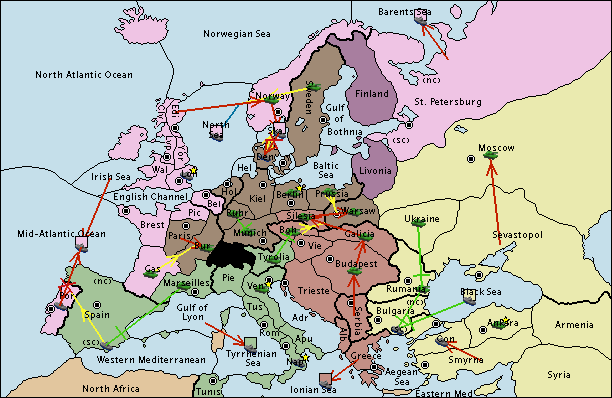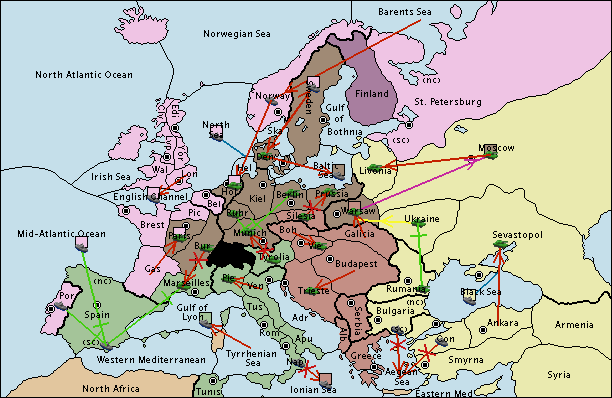Author’s Note:
This article started off as part of a different article, Diplomacy Games are Like Onions, Layer 3: Strategy. However, my draft for the third Onions article keeps growing longer and longer because there is just so much to say about strategy in Diplomacy. After all, Diplomacy is a strategy game, so explaining the strategy of Diplomacy is almost the same as explaining everything about the game.
To keep the third Onions article from being unreadably long, I have spun off this section as a standalone piece. I think this stands on its own as an interesting post. I hope you enjoy!
Your Bored Brother
What are the Strategic Goals in Diplomacy?
I will apply the same formal definition of “strategy” for Diplomacy that I apply to everything else: a plan of action designed to achieve an overall goal.
Let me bring that point into more practical terms. What are the typical strategic (that is, overall) goals for Diplomacy players? I shall list the five basic goals, in a rough order of priority:
Goal 1: Solo Win

Most players begin a match of Diplomacy with some hope of attaining a solo win. Of course, players will have other minor goals (e.g., gaining allies), but usually those goals are incidental to attaining a solo win (allies are necessary for survival and growth, without which a solo win is not possible). A typical player will work towards a solo win for as long as one seems possible. A solo win is not easy to achieve, but a diligent player will either directly advance towards this goal (by conquering additional centers to get closer to 18) or probe for opportunities to make that possible (such as prying apart enemy alliances).
This typical player will change their ultimate goal only when a solo win no longer seems viable. However, precisely when a given player will abandon the goal of a solo win depends on the personality of the player (e.g., are they constitutionally capable of taking huge risks?) and the circumstances of the match (scoring system, tournament structure, etc.).

There are also some rare players who care only about solo wins and nothing else. I’m not sure if there is really a special term for a player like that. Maybe “Soloist?”
Goal 2: Strong Draw

Many, perhaps most, Diplomacy matches end in draws. When a solo win no longer seems possible, or a draw seems inevitable, most players will pursue the best draw result they can get. With Draw-Size Scoring, that would be a small draw (usually 3 players). With Sum-of-Squares Scoring, that would be taking as many supply centers as possible while keeping your rivals numerous and small.
There are a few players out there who deliberately play for strong draws from the start; in the Diplomacy community, these players are often (derisively) called “Care Bears.”
Goal 3: Sneaking into the Draw

At some point, a power may be heavily damaged and on a trajectory towards outright elimination. However, with clever play (usually a strategy I call “Taking Yourself Hostage“), a player can sometimes force their rivals to vote draw.
In my prior writings, I have called this kind of player a “Desperado.” This goal is more common when playing with Draw-Size Scoring (1 center is all you need to share equally in a draw) than with Sum-of-Squares Scoring (holding just 1 or 2 centers will usually award almost zero points, but some player seek the draw just for the honor).
Goal 4: Survival
Some players seek to survive until the end of the match, despite how that goal increases the chances (or even ensures) that another player will solo win.

Most players consider a “survive” and an elimination to be functionally identical (that is, both are a loss). Either because of this attitude (or perhaps, causing the attitude!), scoring systems that offer a player a reward for merely “surviving” against a solo win are rarely used. Nevertheless, there are a few “Survivalist” players who always prefer to survive.
For a few players, survival is a sort of anti-goal; they consider survival against a solo win to be a humiliation. This leads me to the next goal…
Goal 5: Revenge
Sometimes, all of a player’s desired results are no longer possible—but the player has yet to be eliminated from the match. With little else to motivate them, they may either retaliate against whatever player irritated them the most (such as a backstabbing ally) or try to throw the whole match to a player who might get a solo win.

I have previously called such players “Revenge-Seekers.”
Players have different thresholds for when they will resort to revenge. Some choleric players start seeking revenge as soon as they are backstabbed the first time, or even after some plan of their doesn’t really work out. Some players only seek revenge if a rival really “deserves” it. And some players value the hope of making it into a draw so highly that they would not throw that hope away in order to succeed at getting revenge (I count myself among their number).
The Non-Goal: Nihilism
A player who has succumbed to nihilism has no strategy. That player’s soul has left their body. They are no longer trying to do anything in particular. They may stop sending press, and may even stop issuing meaningful orders.

Nihilism is rare in high level matches, but occurs frequently in games with beginners. Some newer players start new matches and immediately give up if they fail to have a blockbuster first year. To deal with the problem, most online Diplomacy sites have features to mildly punish players for abandoning matches.
In my opinion, Sum-of-Squares scoring contributes to nihilism, because players are not offered a reward for fighting for a draw.
Side Story on Nihilism
Your Bored Brother is going to open up a little bit on his personal experiences with nihilism in Diplomacy. I’ve given in to nihilism before—twice that I can recall.
Both times, I felt embarrassed to ineffectively backstab a very loyal ally. My former ally was able to get other players on their side and turn things around. I, however, lost all motivation to try to turn things around for myself, or to otherwise finish out the match honorably. I felt like I deserved to lose. I humiliated myself. I just wanted the match to end and forget about how I had messed things up for myself…so obviously and so badly. I regretted that a smarter-played backstab would have put me close to a solo win, and regretted that I could have just played out my alliance to a good draw.
I almost certainly still had the ability to get a good draw after the ineffective backstab, but I would have had to work really hard both politically and tactically. However, I lost all motivation to fight. I succumbed to nihilism and just laid down and waited to die (so to speak).
These personal examples feel like they happened a long time ago now. I’d like to think that I’ve built up my mental fortitude since then. But I am happy to share the tale with you, dear reader, to demonstrate how human Diplomacy really is. I have sympathy for players who occasionally succumb to nihilism during a match.
Players Conceal their Goals
Although some of your rivals will truthfully reveal their goals to you during the match, a wise player knows not to take these assertions at face value. This is because your rivals have strategic incentives to confuse you about their true intentions. Typically (but not necessarily!) a lying rival will claim to be aiming for a lower goal on the hierarchy than they truly are.
Predatory Soloists impersonate Care Bears in order to set up ideal backstabs (I do this all the time and find this strategy very effective). Ruthless Desperado players act like maniacal Revenge-Seekers to frighten players into voting for a draw (I do this all the time and find this strategy very effective). And true Care Bears will usually fake that their alliance hangs by a thread, even going so far as to fake-fight, so that everyone else underestimates their mutual commitment to the alliance.

I’ve even witnessed players “play opossum” by sending nihilistic messages and going completely limp (i.e., entering no orders), luring others into ignoring them…only to come back with more vigor than ever after their rivals switch to more-dangerous-seeming enemies—or even start infighting over the apparent spoils!
In Diplomacy, it pays to stay paranoid.
Non-Strategic Goals
In passing, let me say that some players have goals that are outside the incentive structure provided by the game itself. One might call these “non-strategic” goals. These are goals like:
- Making real friends. Not only is making friends per se a laudable goal, but a player with a good reputation will be invited to fun matches in the future.
- Proving something. Some players want to achieve outrageous tactical feats, or show that a two-way draw is possible, or that they’re willing to backstab even a very friendly ally—the list of ideas goes on and on. When you play dozens or hundreds of matches of Diplomacy over many years, sometimes you feel motivated to do something just to “spice things up.”
- Passing the time. Some players enter matches with no particular goal in mind, and don’t necessarily care about any particular result, but aren’t nihilists (that is to say, they will play the game seriously and in good faith, despite not caring that much about the outcome).
And so on. One way of describing the difference between strategic goals and non-strategic goals is that non-strategic goals are subjective; attaining these achievements may be important to the individual, but are not part of the formal reward system of a Diplomacy match.
“Survival” and “Revenge” arguably belong on this addendum because they are subjective goals (at least, when the scoring system or tournament structure treats all forms of losing identically). However, those goals come up quite often during matches, so I think it would be misleading to leave them out of the main list.
My Advice: Don’t Take Non-Strategic Goals Too Seriously
Subjective goals are best understood as secondary goals and not per se the strategy of a player. To put it another way: It’s a great thing to be playing the game as best you can and to make a new friend at the same time. It’s neat when a crazy move seems advantageous, and then it works. But, for Pete’s sake, don’t prioritize those goals over the game’s objective goals (liking winning or getting a good draw)—and definitely be suspicious of players who explicitly state that they hold subjective goals more dearly than winning.
I know that there are a few players who (against my advice, obviously) do prioritize certain subjective goals. However, I presume that a player who asserts such a goal during the middle of a match is just trying to distract me. Conversely, in my matches, I am quick to assert subjective goals whenever I think that my rival will accept what I am saying; such assertions cost me nothing while confusing my rival as to my true strategic intentions.
Statements about subjective goals like “I’m here to make friends!” are misleading even when they are true. I, for one, relish backstabbing my real friends even more than backstabbing strangers. I grew up playing games like Poker and Mafia with my closest family and best friends. It’s much more difficult to bluff someone who knows you, and therefore all the more satisfying.
Example: ODC 2019 – R1 G4 (Feb 2019—Apr 2019)
This is the press match I recorded in my Journal. I played as England.
Starting on the very first turn, I allied Germany. My plan was to gain Germany’s cooperation against our mutual foes France and Russia, and in the meanwhile build up Germany’s trust as high as possible so that I would later be able to successfully backstab my German ally. In my journal, I explained that my ideal plan was to wait until I captured Tunis.
I did accomplish my strategic goal of charming Germany to trust me beyond what was necessary, and then massively backstabbed Germany. Unfortunately for me, I chose to backstab before I captured Tunis, and thus a solo win was unrealistic and I did not achieve a solo win (the remaining players, in the typical fashion, walled me in behind a stalemate line). But I did get a big score for tournament purposes.
There were three critical succeeding moments that set me up to successfully backstab Germany:
(1) On the Autumn 1903 turn, I used my press to convince Germany that I shouldn’t cede any of my centers. I was willing to (and did) say almost everything I could think of to persuade Germany to agree not to take any of my centers.

(2) The Autumn 1903 moves resulted in each of us getting a build (instead of Germany getting two and my getting zero). On the follow-up Winter 1903 turn, Germany agreed that I should build a fleet at London to “fake” that I was about to attack Germany. In other words, my move was objectively hostile to Germany on the Tactical Layer, but Germany believed that I was not hostile. This imbalanced the power greatly in my favor. Although we superficially appeared to have about the same number of supply centers, my position as a corner power made me far stronger.

(3) On the subsequent Spring 1904 turn, I got Germany to reveal all his moves to me and to choose moves that would be defenseless against my attacks. Then I plunged the knife into his back.
These moments, strung together, allowed me to make a devastating backstab on Germany, resulting in my taking most German centers and eventually ending the game with 16 supply centers.

In my opinion, Germany trusted me beyond what was necessary. I think Germany kept working with me because I because it seemed fun to do so. Germany probably just enjoyed talking things through with someone who was interested in and liked him (I was genuinely interested in and liked him; that didn’t mean I would never backstab!). Germany overestimated the truth-value of the Political Layer (thinking, perhaps unconsciously, that my friendship, words, and charm were really the game itself).
I don’t think it was strategically plausible that I was deliberately playing for a draw with Germany (something I stated as my goal many times) because it is not really possible for England to get a good draw score while playing with Germany. For Germany to think that I was not planning on a solo win attempt or even a strong draw, Germany must have incorrectly believed that I prioritized subjective goals (like refusing to backstab friends on principle). I think Germany came to believe that because Germany was (apparently) willing to play like that himself, and I had so mirrored Germany’s press style that Germany was convinced that I was like him too.
However, if Germany had been thinking about the Strategic Layer (which I’ll write about soon!), Germany might have been able to sense my true intentions. I labored so hard to not cede Belgium to Germany, even though I had previously said I was willing to cede centers and was willing to allow Germany to have more units than me. Germany could have paid more attention to how I was creating an objective situation that put him in more and more danger. Germany could have inferred, on sheer intuition, that because we were playing in a Diplomacy tournament, and because there were players there (such as me!) who were playing to win… probably a player’s friendliness is no indication of their true strategy. Charming and deceiving allies in order to backstab them is the bread-and-butter strategy of Diplomacy.
If Germany had it in mind that at all times “England has some kind of selfish strategy,” Germany could have enjoyed my charming messages while still looking out for himself tactically, and while still not revealing all his moves, and so on.
Read More by Your Bored Brother!
If you are interested in reading more about basic goals in a Diplomacy match, I have a post (and a guest post!) about the scoring systems used on webDiplomacy and how scoring systems affect those goals.
If you are interested in reading more about how to see through your rivals’ misdirections regarding their goals, you should read my series about the layers of Diplomacy.